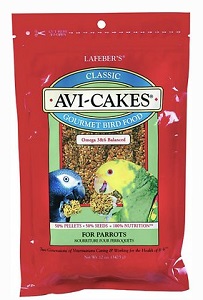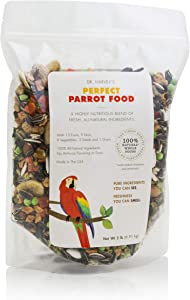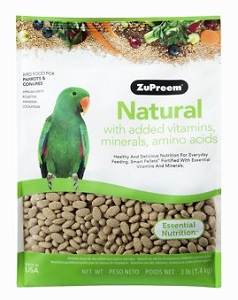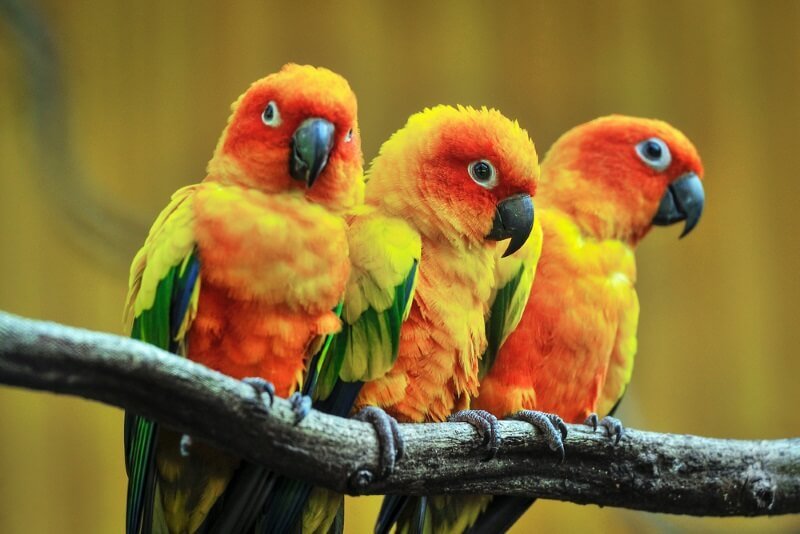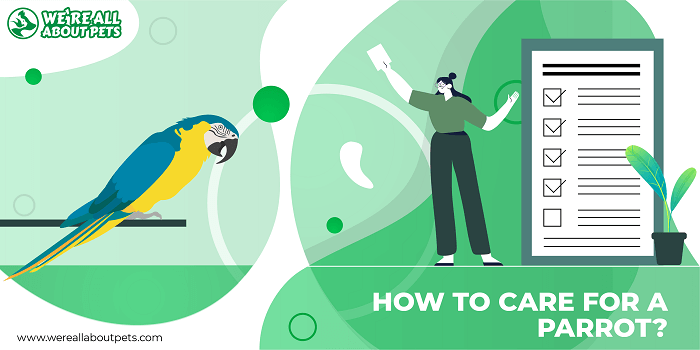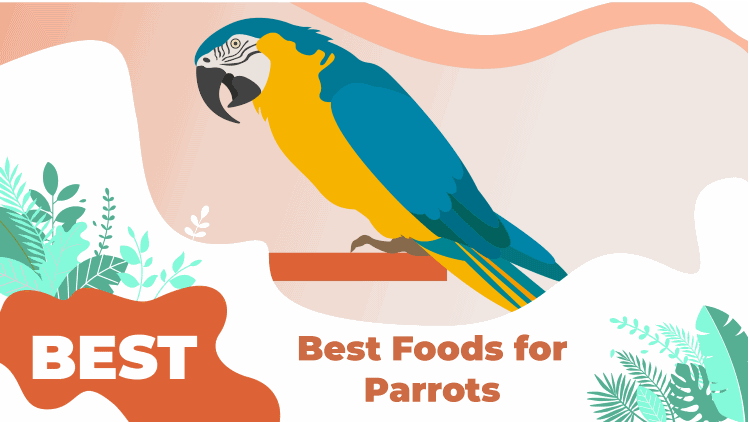What Do Parrots Eat?
This page contains affiliate links. We may earn money or products from the companies mentioned in this post through our independently chosen links, which earn us a commission. Learn More
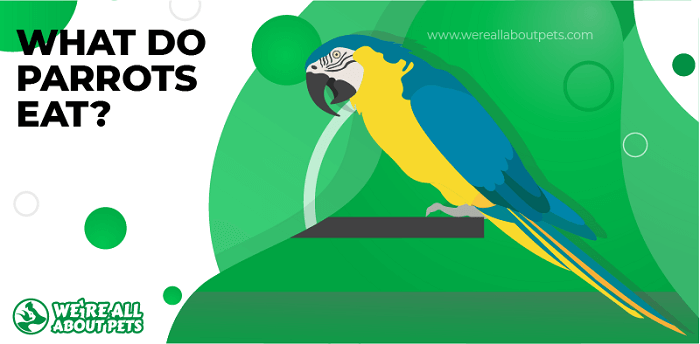
What do you picture when you hear the word parrot? The truth is, there are over 350 different species of parrot including popular pets like parakeets (budgies), cockatiels, lovebirds, and more.
Parrots make unique pets to be sure, but there are some challenges to consider. For one thing, parrots are fairly long-lived – some species live 30 years or more with proper care. Parrots are also much different than traditional pets like cats and dogs when it comes to things like diet.
Providing your parrot with a healthy diet is essential for its long-term wellness, but finding the right diet isn’t always easy. Your parrot’s nutritional needs vary depending on the species, so you’ll need to do some research of your own to determine the ideal diet for your pet.
Though every species of parrot is unique, there are certain things that are fairly consistent, including many of the foods that are safe to feed and some that are harmful or potentially toxic.
Here’s what you need to know about safe and unsafe food for your parrot.
Quick Navigation
Safe And Unsafe Foods For Parrots

Before feeding your parrot anything, you need to be sure it is safe. When it comes to dietary staples like seeds, fruits, and vegetables, most options are fine but there are some to be wary of. Not knowing that a food could potentially harm your parrot is dangerous – you don’t want to make a mistake.
Wondering what your parrot can and can’t eat? We’ve assembled a list of dozens of foods that are and aren’t safe for your parrot. Check them out below!
31 Foods That Are Safe For Parrots:
Parrots will eat a wide variety of fruits and vegetables, most of which are safe. Just be sure to double-check the list of toxic foods below or make sure the food is on this list:
- Seeds
- Seed mixes
- Bird pellets
- Apples
- Bananas
- Blackberries
- Cherries (no pit)
- Dates
- Figs
- Grapefruit
- Kiwi
- Melon
- Pears
- Pineapple
- Plums
- Mango
- Papaya
- Peaches
- Strawberries
- Asparagus
- Carrots
- Cabbage
- Butternut squash
- Corn
- Cucumber
- Kale
- Parsnips
- Dandelion greens
- Pea pods
- Cuttlefish
- Oyster shells
13 Foods Parrots Can Eat In Moderation:
While many of the foods below are safe for parrots, it’s best to feed them in moderation. This includes high-fat foods, meat, cooked grains, and wild vegetation like these:
- Nuts (unsalted)
- Grapes
- Cooked beans
- Cooked potatoes
- Cooked sweet potatoes
- Dandelions
- Chickweed
- Hawthorn berries
- Whole grains
- Whole-grain cereal (unsweetened)
- Small amounts of cooked fish
- Hard-boiled egg
- Cooked lean meat
8 Foods That Are Not Recommended For Parrots:
You may not need to panic if your parrot eats the occasional chip or cracker, but these foods shouldn’t be a replacement for a balanced diet. These foods are not recommended but may not be toxic:
- Human food
- Junk food
- Fried food
- Peanuts
- Dairy
- Grit
- High-fat foods
- High-sugar foods
11 Foods Parrots Should Not Eat:
While some foods that aren’t’ recommended for parrots may not do any harm, there are certain foods that are toxic to birds. Avoid these foods entirely:
- Avocado
- Onions
- Mushrooms
- Garlic
- Fruit pits
- Fruit seeds (especially apple)
- Coffee or tea
- Alcohol
- Rhubarb
- Chocolate
- Sugar-free candy
Understanding which foods are and are not safe for your parrot is very important, but a healthy start starts with understanding your parrot’s nutritional requirements. Read on to learn the specifics of what to feed your parrot in different life stages.
Types Of Parrot Diets
The first choice you have to make when choosing a diet for your pet parrot is whether you’re going to feed a pellet or a seed-based diet. You can certainly mix the two, just make sure your parrot is getting a variety of foods and ensure that his nutritional needs are being met.
If you choose a seed-based diet, the seed should still only comprise up to 60% of the total daily diet. You should still offer some pellets and include a larger proportion of fresh fruits, veggies, nuts, and other foods. If you choose a pellet diet, the pellets should comprise up to 75% of the diet.
Here is a quick breakdown of the different components of a pet parrot’s diet:
- Seeds and Grains – Seeds make up the majority of a wild parrot’s diet in many species, but pet parrots may do better on a pellet diet in terms of balanced nutrition. Parrots tend to pick their favorite seeds out of the mix. Make sure any seed you offer your parrot is fresh.
- Pellets – Commercial pellets for birds are formulated for specific species or size categories of parrots. Pellets are designed to provide balanced nutrition which makes them a sensible option for many bird owners. Just remember to supplement the diet with fresh foods as well.
- Fruits and Vegetables – Most parrots eat fresh fruits and vegetables as part of their natural diet. In the home, these foods help provide variety as well as supplements to a pellet or seed diet.
- Nuts– While most parrots feed primarily on seeds, fruits, and vegetables, nuts and grains make up a part of the diet for certain species. Larger parrots like macaws are more likely to eat nuts as part of their natural diet.
- Treats – The majority of your parrot’s diet should come from seed or pellets and fruits and vegetables. Treats should be offered only a few times a week and in small amounts.
Now that you know what kinds of foods will make up your pet parrot’s daily diet, you’re probably wondering how much to feed. Keep reading to learn about feeding recommendations for these birds.
Meeting Your Pet Parrot’s Nutritional Needs
Before choosing a diet for your parrot, you should do some research to make sure you understand the nutritional needs of the specific type of parrot you’re keeping.
For example, smaller parrots like lovebirds and parrotlets may prefer a diet of small seeds and pellets supplemented with chopped fruits and veggies. Larger parrots like cockatoos, African greys, and eclectus may include more nuts in their diet along with larger seeds and whole or sliced fruits and veggies.
Every parrot is different, but the general dietary recommendations are similar for many species. The primary difference in terms of feeding comes down to the parrot’s size.
To give you an idea what parrots eat and much you should be feeding your pet parrot depending on its size, refer to the chart below:
Daily Parrot Feeding Chart |
||||
| Size | Seeds | Pellets | Fruits/Veggies | Treats |
| Small
(ex: budgies, canaries, lovebirds, parrotlets) |
40% to 60% of the total daily diet
OR 75% commercially balanced pellets |
40% to 60% of the total daily diet
OR 75% commercially balanced pellets |
A few slices or pieces equivalent to 1-2 teaspoons | Occasional, small amounts |
| Medium (ex: conures, cockatiels, caiques) |
1 to 3 tbsp. seeds
OR 1 to 3 tbsp. pellets |
1 to 3 tbsp. seeds
OR 1 to 3 tbsp. pellets |
20% to 25% of the daily diet from chopped mixed fruits and veggies | Occasional, small amounts |
| Large
(ex: Amazon, cockatoo, eclectus, African grey, macaw) |
2 to 6 tbsp. seeds
OR 3 to 6 tbsp. pellets |
3 to 6 tbsp. seeds
OR 3 to 6 tbsp. pellets |
20% to 25% of the daily diet from chopped mixed fruits and veggies | Occasional, small amounts |
In addition to providing a healthy and balanced diet for your parrot, be sure to provide access to fresh water at all times as well. Birds tend to get their water dishes messy with dropped seed, so be prepared to clean and refill the dish at least once a day.
Recommended Commercial Parrot Foods
Whether you choose to feed your parrot seeds or pellets (or both), it’s important to choose a high-quality product. Make sure it is made with wholesome, natural ingredients and free from artificial additives like preservatives.
Remember, different parrot species have different nutritional needs, so look for a species-specific recipe. At the very least, choose a product formulated for parrots of the appropriate size.
Here are some of our top picks for the best commercial parrot food:
Lafeber Original Avi Cakes for Parrots
Guaranteed Analysis
- Protein: 12.5% Min
- Fat: 4.5% Min
- Fiber: 5% Max
- Moisture: 15% Max
A favorite among parrot owners, these avi cakes are packed with wholesome natural ingredients and designed for encourage foraging behavior to make mealtime fun. These avi cakes consist of 50% nutritionally-optimized pellets and 50% whole grains. Plus, they are made in the USA and free from artificial additives.
Here are the ingredients:
Ground Corn, Canary Grass Seed, Cracked Corn, White Proso Millet, Hulled Oats, Wheat Flour, Sugar, Peanuts, Red Millet, Soybean Meal, Ground Limestone, Dicalcium Phosphate, Canola Oil, Whole Egg, Corn Gluten Meal, Cane Molasses, Gelatin, Glycerine, Iodized Salt, L-Lysine (An Essential Amino Acid), Dl-Methionine ( An Essential Amino Acid), Choline Chloride, Citric Acid, Mixed Tocopherols (A Preservative), Manganous Oxide, Zinc Oxide, Vitamin A Supplement, Vitamin D3 Supplement, Vitamin E Supplement, Niacin Supplement, Calcium Dipantothenate, Riboflavin Supplement, Thiamine Mononitrate, Pyridoxine Hydrochloride, Vitamin B12 Supplement, Folic Acid, Biotin, Ascorbic Acid, Sodium Selenite.
Harvey’s Perfect Blend Natural Food for Large Parrots
Guaranteed Analysis
- Protein: 12% Min
- Fat: 15% Min
- Fiber: 7% Max
- Moisture: 12% Max
If you prefer to feed your parrot a blended diet, this mixture from Dr. Harvey’s is a great option. This mix includes a variety of foods like your parrot would find in natural including 13 types of seeds and nuts with 18 types of fruits and vegetables. All the ingredients are healthy and natural – no artificial additives.
Here are the ingredients:
Papaya, Safflower Seed, Sunflower Seed, Macadamia Nuts, Pine Nuts, Walnuts, Filberts, Cashews, Brazil Nuts, Pistachios, Pecans, Almonds, Peanuts, Pumpkin Seeds, Corn, Apricots, Pineapples, Coconut, Raisins, Carrots, Apples, Bananas, Peas, Cranberries, Mangos, Peaches, Pears, Green Beans, Broccoli, Green Bell Peppers, Red Bell Peppers, Parsley
ZuPreem Natural Medium/Large Bird Food
Guaranteed Analysis
- Protein: 14% Min
- Fat: 4% Min
- Fiber: 5% Max
- Moisture: 10% Max
For parrot owners who prefer the nutritional balance of a pelleted diet, this formula from ZuPreem is a good option. Formulated for medium and large species, these pellets provide a high-quality diet fortified with essential nutrients.
Here are the ingredients:
Ground Corn, Soybean Meal, Ground Millet, Ground Oat Groats, Ground Barley, Ground Wheat, Wheat Germ Meal, Sugar, Vegetable Oil (Preserved with Mixed Tocopherols), Ground Flaxseed, Calcium Carbonate, Dicalcium Phosphate, Iodized Salt, Dl-Methionine, Dried Carrots, Dried Celery, Dried Beets, Dried Parsley, Dried Cranberries, Dried Blueberries, Choline Chloride, L-Lysine, Vitamins (Vitamin E Supplement, Niacin, Calcium Pantothenate, Vitamin A Supplement, Biotin, Riboflavin, Pyridoxine Hydrochloride, Thiamine Mononitrate, Menadione Sodium Bisulfite Complex (Source of Vitamin K Activity), Vitamin B12 Supplement, Vitamin D3 Supplement, Folic Acid), Preserved with Mixed Tocopherols and Citric Acid, Hydrolyzed Yeast, L-Ascorbyl-2-Polyphosphate (a Source of Vitamin C), Minerals (Manganous Oxide, Zinc Oxide, Copper Sulfate, Sodium Selenite, Calcium Iodate), Rosemary Extract.
Looking for more recommendations on what to feed your pet parrot? Check out our in-depth guide to the best commercial parrot foods.
Parrot Feeding FAQs
What do parrots eat in the wild?
In the wild, parrots will eat a wide variety of foods depending on the species. Most parrots are omnivores but tend to feed on seeds, nuts, fruits, and vegetables. Some parrots may eat insects and other vegetation like blossoms as well.
How much do parrots eat?
The amount a parrot eats depends on its size. Small parrots like budgies may only require a few teaspoons of food per day while larger species like Amazons and African greys may need closer to ¼ cup or ½ cup of pellets, plus fruits and vegetables.
What do parrots drink?
Parrots drink water and they should have fresh water available at all times. Make sure to clean and refill your parrot’s water dish at least once a day.
Do parrots eat insects?
Parrots are technically omnivores which means they are able to digest foods other than plants. Insects may be included in a wild parrot’s diet, but they are generally not a big part of it. You can offer your parrot insects as an occasional treat.






